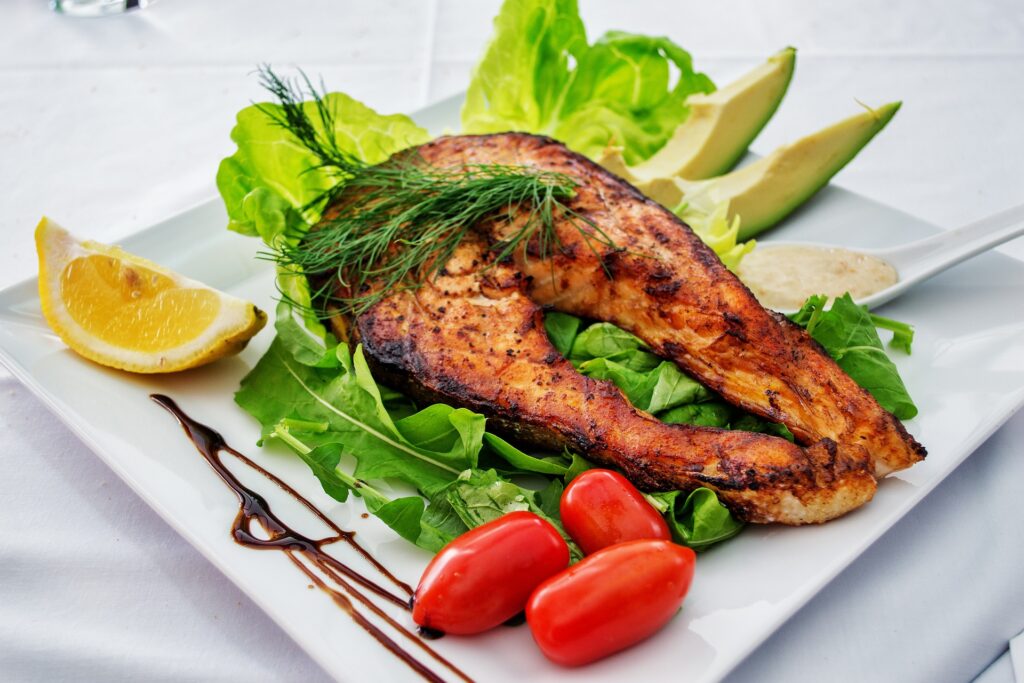Nutrition is very important during pregnancy for the health and wellbeing of the growing baby as well as the mother. Pregnancy is a miraculous experience. During this time, eating a well-balanced diet full of vital nutrients is necessary. Superfoods can add an additional dose of vitamins, minerals, and antioxidants to assist the growing fetus and improve the health of the mother. We’ll look at many superfoods and their amazing health benefits in this guide, including those that are especially good for pregnant moms.
Spinach
Rich in calcium, fiber, iron, folate, and vitamins A, C, and K, spinach is a nutritional powerhouse. During pregnancy, iron is necessary to avoid anemia, while folate is important for embryonic growth and lowers the incidence of neural tube abnormalities. Vitamin C helps absorb iron and strengthens the immune system, vitamin K promotes healthy bone development in both the mother and the child, and vitamin A supports vision and immune function. Furthermore, the fiber content lessens the likelihood of constipation, which is a frequent pregnant symptom.

Avocado
Packed with of fiber, folate, potassium, healthy fats, vitamins C, E, and K, and healthy fats, avocados are also very nutritious. The monounsaturated fats help the developing brain and nerve system of the newborn, while the folate helps to avoid birth abnormalities. Potassium lowers the risk of preeclampsia, a dangerous illness that can develop during pregnancy, by assisting in blood pressure regulation. Avocados also include a lot of antioxidants, such as vitamin E, which shield cells from harm and support healthy skin.

Salmon
Rich in omega-3 fatty acids, especially DHA (docosahexaenoic acid), salmon is particularly beneficial for the brain and visual development of a developing infant. Additionally, omega-3s have anti-inflammatory qualities that help reduce joint pain and swelling associated with pregnancy. Salmon also contains high-quality protein, vitamin D, and B vitamins, such as niacin and B12. These nutrients stimulate neuron and energy generation. Picking wild-caught salmon is crucial, though, if you want to reduce your exposure to toxins like mercury.

Greek Yogurt
Packed with calcium, protein, probiotics, and vitamin D, Greek yogurt is a nutrient-dense food. Protein promotes growth and development, while calcium is necessary for the developing baby’s strong bones and teeth. Probiotics support the immune system and digestion by assisting in the maintenance of a balanced population of gut bacteria. When taken in sufficient amounts, vitamin D can lower the risk of gestational diabetes and premature birth in addition to playing a critical role in calcium absorption and bone health.

Berries
Rich in fiber, vitamins, minerals, antioxidants, and fiber are berries including strawberries, blueberries, raspberries, and blackberries. Antioxidants play a crucial role in shielding cells from oxidative damage and inflammation, particularly during pregnancy when the body experiences heightened physiological demands. Vitamins like C strengthen the immune system and iron absorption, while fiber facilitates digestion and helps avoid constipation. Berries are a delicious and refreshing snack for expectant mothers because they are high in water content and low in calories.

Lentils
Rich in protein, fiber, folate, iron, and other vital nutrients, lentils are a great plant-based source of these nutrients. While folate is essential for maintaining placental health and preventing neural tube abnormalities, protein is necessary for the growth and development of the fetus. Iron promotes the baby’s oxygen delivery and helps avoid anemia, while fiber assists with digestion and controls blood sugar. Pregnant women can benefit from lentils’ reduced fat and cholesterol content, which makes them a heart-healthy option.

Sweet potatoes
Rich in fiber, potassium, beta-carotene, vitamins A and C, and complex carbs are sweet potatoes. Both the mother and the developing child need carbohydrates for energy, while fiber aids in digestion and keeps blood sugar levels steady. Vitamin C increases the creation of collagen and improves the absorption of iron, while vitamin A is necessary for immune system and visual functions. Potassium lowers the risk of edema and hypertension during pregnancy by regulating blood pressure and fluid balance. Precursor to vitamin A, beta-carotene is a potent antioxidant that promotes skin health and may lower the chance of some birth abnormalities.

Eggs
Packed with high-quality protein, vitamins, minerals, and choline, eggs are a nutrient-dense food. Choline is vital for brain growth and cognitive function, while protein is necessary for the construction and repair of tissues. Vitamins D, B12, and folate are also found in eggs and support healthy bones, neurological function, and prenatal development, respectively. Furthermore, lutein and zeaxanthin, two antioxidants that support eye health and may lower the baby’s risk of developing specific visual issues, are found in eggs.

Chia Seeds
Packed with fiber, protein, antioxidants, omega-3 fatty acids, and a host of vitamins and minerals, chia seeds are a little nutritional powerhouse. Chia seeds are tiny, but they’re nutrient-dense, and that can help the developing baby as well as the mother. Alpha-linolenic acid (ALA), one of the omega-3 fatty acids found in chia seeds, supports the development of the embryonic brain and may lower the risk of premature birth. Furthermore, the high fiber level helps reduce constipation, a typical pregnant problem, and supports digestive health. Chia seeds are a simple way to add extra nutrients to meals and snacks. You can sprinkle them over salads, yogurt, oats, or yogurt. You can even add them to smoothies.

Broccoli
A cruciferous vegetable, broccoli is high in antioxidants like sulforaphane, folate, and fiber in addition to vitamins C, K, and A. While vitamin K promotes blood coagulation and bone health, vitamin C strengthens the immune system and improves iron absorption. While folate is critical for maintaining placental health and preventing neural tube abnormalities, vitamin A is necessary for immune system and vision. Broccoli contains a strong antioxidant called sulforaphane, which has been connected to a number of health advantages, such as less inflammation and enhanced heart health. Broccoli is a nutrient-dense food that can enhance the health of both the mother and the fetus during pregnancy.

Quinoa
Packed with of nutrients, quinoa is a great source of fiber, protein, vitamins, minerals, and antioxidants. Quinoa is a complete protein, which means that it has all nine essential amino acids that the body is unable to manufacture on its own, unlike many other cereals. Fiber facilitates digestion and helps keep blood sugar levels steady, while protein is necessary for the growth and development of the fetus. In addition, quinoa has high concentrations of iron, magnesium, and zinc, as well as vitamins B and E, all of which are important for immune system health, energy production, and neuron function. Quinoa is also free of gluten, which means that pregnant women who have celiac disease or gluten sensitivity can safely eat it.

Walnuts
Rich in protein, fiber, antioxidants, minerals, and omega-3 fatty acids, walnuts are a nutrient-dense nut. Alpha-linolenic acid (ALA), in particular, is an omega-3 fatty acid that is essential for the development of the embryonic brain and may help lower the risk of preterm birth. Vitamin E, which functions as a potent antioxidant to shield cells from oxidative damage, is also present in walnuts. Walnuts also contain minerals like manganese, magnesium, and phosphorus that help with energy production, antioxidant activity, and bone health. Including walnuts in your pregnancy diet can help you get important nutrients that support both the health of the mother and the development of the fetus.

Oranges
Rich in fiber, antioxidants, vitamin C, and a host of other vitamins and minerals, oranges are a citrus fruit. Iron absorption is improved and the immune system is strengthened by vitamin C, both of which are critical for preventing anemia during pregnancy. In addition, oranges provide potassium, folate, and vitamin A, all of which are beneficial to mother and fetal health. The presence of flavonoids and other antioxidants protects cells from harm and supports heart health, while the fiber level facilitates digestion and helps avoid constipation. Oranges and other citrus fruits can be a delightful and nourishing way to get the vitamins and minerals you need each day while pregnant.

Almonds
Packed with protein, fiber, healthy fats, vitamins, minerals, and antioxidants, almonds are a nutrient-dense nut. While healthy fats, especially monounsaturated fats, promote overall health and brain development, protein is necessary for the growth and development of the fetus. Vitamin E, a strong antioxidant that shields cells from oxidative damage and supports healthy skin, is another ingredient found in almonds. Almonds also contain minerals that assist immune system function, energy production, and bone health, such as magnesium, manganese, and copper. During pregnancy, almond snacks can offer a gratifying and nourishing boost of vital nutrients.

Dark Leafy Greens
Rich in vitamins, minerals, antioxidants, and fiber, dark leafy greens such as kale and Swiss chard are nutritious powerhouses. Among other nutrients, these greens are high in folate, calcium, magnesium, iron, vitamin K, and vitamins A and C. Vitamin K is essential for blood clotting and bone health, while folate is critical for preventing neural tube abnormalities and maintaining placental health. While vitamin C increases the formation of collagen and improves the absorption of iron, vitamin A helps immune system function and vision. While calcium and magnesium support bone health and muscle function, iron is necessary to avoid anemia. Including dark leafy greens in your pregnancy diet will help you receive a variety of vital nutrients that promote both the health of the mother and the development of the fetus.
Conclusion
Including a wide variety of superfoods in your pregnancy diet will help you get vital nutrients that promote both the health of the mother and the development of the fetus. These nutrient-dense foods, which range from leafy greens and fatty fish to nuts, seeds, and whole grains, provide a variety of vitamins, minerals, antioxidants, and other health-promoting substances. Expectant moms may fuel their bodies and provide the best start in life for their newborns by emphasizing nutrition and making good dietary choices. Never forget to get advice on a customized diet during pregnancy from a medical professional or a qualified dietitian.



